Playing with fire: Almost half of all Midlands call-outs are arson attacks
Nearly half of all fires in the West Midlands are started deliberately, new figures have revealed.
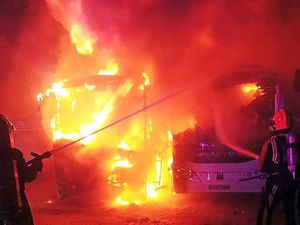
Of the 10,562 blazes West Midlands Fire Service attended in 2017/18, 4,807 were arson attacks.
In neighbouring Staffordshire, 1,838 of the 3,245 fires recorded were started deliberately. The Home Office figures for Staffordshire include 160 deliberate vehicle fires and more than 200 buildings being torched.
The figures for Staffordshire do not include the 1,475 grass fires crews had to attend last summer, 75 per cent of which were arson.
The figures have led to warnings that arsonists are putting the lives of firefighters and members of the public at risk, as well as using up the ‘precious time and resources’ of fire crews.
There were 1,851 house fires in 2017/18 in the West Midlands, 221 of which were started deliberately.
A total of 1,351 cars and other motor vehicles caught fire over the same period, with 868 torched deliberately.
'Deeply concerned'
The majority of deliberate fires were classified as minor, also known as secondary fires. In the West Midlands there were 6,373 minor fires, 3,350 of which were arson.
The figures do not include chimney fires, of which there were a nominal amount.
In neighbouring Shropshire there were 459 deliberate fires out of 1,114 recorded.
The Fire Brigades Union said it is “deeply concerned” by the figures.
Executive council member Matthew Lamb told the Express & Star: “There is a significant number of arson attacks across the West Midlands, Shropshire and Staffordshire. Deliberately caused fires put the lives of firefighters and members of the public at risk, and use up precious time and resource.
See also:
“Despite the government calling an end to austerity, the truth is that the cuts continue to leave services overstretched and under-resourced – Fire and Rescue Services can ill afford to be fighting fires which have been caused deliberately.
“Response times in England are now five per cent slower compared to 2010 and deliberately caused fires further limits firefighters’ ability to respond to emergencies elsewhere.”
West Midlands Fire Service has described deliberate fires as a ‘menace’, adding: “The consequences of fires started deliberately can’t be under-estimated. They’re a menace on many levels: the huge emotional cost of a life lost; the distress and disruption caused by the destruction of a home, business or vehicle; environmental pollution and the financial cost.”
Shocking toll of arson attacks in the Midlands
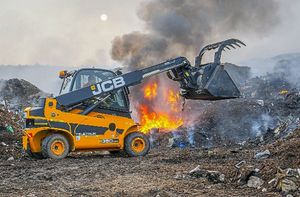
In what was one of the longest-running fires ever recorded in this country, firefighters tackled a blaze at Slitting Mill farm in Rugeley for around a year and a half.
More than 300 firefighters spent almost 500 hours tackling the fire, which it is believed was started deliberately.
The fire broke out in September 2016 and was not extinguished until March 8 last year.
Firefighters had to inspect the site up to once a week at points and thick black smoke spread up to four miles when it was at it’s worst, affecting nearby residents.
It would have taken large volumes of water to extinguish the blaze instead Staffordshire Fire and Rescue Service decided to cap the fire to allow the combustion to continue but reduce the emission of smoke to reduce the impact on those living close-by. A Freedom of Information request later revealed that the fire had cost taxpayers more than £35,000 to tackle and extinguish.
Tim Hyde, director of response at Staffordshire Fire and Rescue Service, said: “This incident was very drawn out and protracted, with crews returning to the site numerous times over a year and half. It took considerable resources to reach a conclusion.
“The risks to fire crews and environmental conditions on site meant that the hire of heavy plant was the safest and most effective way to reduce the effect of the fire on the local community and environment.
“While the hire fees were significant they did reduce the need for large numbers of firefighters to be on scene.”
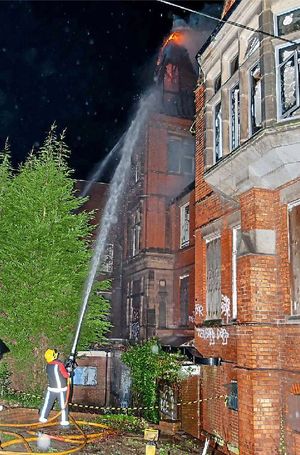
Wolverhampton’s dilapidated eye infirmary has been targeted by arsonists for years, as the row over what to do with the site rumbles on.
The site, on Compton Road, has caught fire multiple times since it became derelict 12 years ago.
The most recent fire came just a few weeks ago when 23 firefighters were called to the four-storey building to tackle yet another blaze.
Firefighters spent hours dousing the fire, and had to return the following morning to check all was ok.
The worst fire at the site, which has become a hotspot for squatters and vandals, came in 2013.
Almost 30 firefighters were called to tackle the blaze on the first floor as smoke billowed out onto the street.
Fire crews had to rescue three men from the building. Witnesses reported seeing squatters enter the building 15 minutes before the fire broke out.
The infirmary, which closed in 2007 when services moved to New Cross Hospital, is currently at the centre of a courtroom battle between Wolverhampton Council and the Royal Wolverhampton NHS Trust.
The council served an enforcement notice on the health trust last year, ordering bosses to complete a major clean-up operation at the site.
But the council says that some of the work has not taken place – and it has now emerged that the matter has gone before the courts.
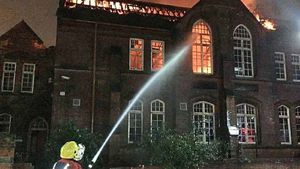
The former Sandwell College building on Crocketts Lane in Smethwick drew the attention of arsonists after becoming derelict back in 2012.
Between August and November 2016, the building was targeted five times, with the last coming on November 30.
Dozens of firefighters were called out each time to the site, with the building become more dangerous and treacherous each time.
The Smethwick Campus became derelict after Sandwell College courses were centralised by the opening of a £77m campus in West Bromwich.
The site has now become swish apartments ready for tenants.
Planning permission was granted for the homes in 2016, with developers being brought on-board the following year to start work on the site.
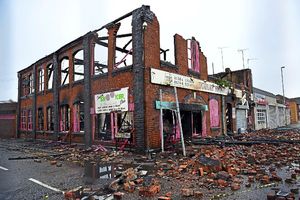
Dudley Snooker and Pool Club was left completely gutted after an arson attack back in 2015.
More than 50 firefighters battled the fire for five hours but could not save the building, which had to be torn down.
Plans for the site to be turned into a petrol station were approved by Dudley Council planners in 2017.
The fire on May 23 also severely damaged neighbouring business Price 2 Beat Bespoke Bedrooms and Kitchens.
Flames from the fire stretched 10ft above the snooker and pool club, with nearby residents warned to shut their windows and doors.
No one was injured but West Midlands Ambulance Service had to attend anyway due to the sheer number of firefighters in attendance and the fear of smoke inhalation.
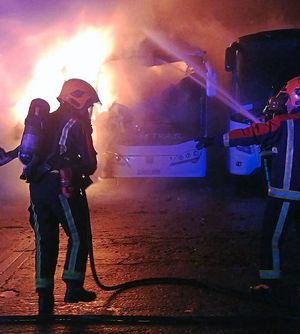
Last month a number of coaches in Walsall were destroyed after an arson attack on a travel firm.
Fastline Travel, in Wednesbury Road in Bescot, was targeted around 8.20pm on December 5 when a number of its coaches caught fire.
A total of 10 firefighters had to attend the blaze, which involved three of the company’s coaches.
Two of the vehicles were left completely destroyed, while a third sustained significant heat damage during the dramatic incident.
After the fire West Midlands Police confirmed it was treating the fire as a case of arson.
During the blaze, the company’s coaches were seen to be burning bright as the fire took hold.
Nobody is understood to have ever been arrested over the fire.
However, anybody with any information about the offence can contact police on 101.
The officers in the line of fire
“Deliberately set fires are dangerous; they waste time and money, and keep our crews away from real emergencies.”
That’s the message from fire services across the region, after it was revealed nearly half of all fires in the West Midlands, Staffordshire and Shropshire are started deliberately.
Of the 14,921 started across the three counties in 2017/18, 7,101 have been classed as arson.
So what is being done to help prevent such a dangerous crime?
In Staffordshire, the fire service focuses its efforts through education. It recently ran a campaign called Flames Aren’t Games, whereby youngsters could win a £50 gift card if they pledged not to start deliberate fires.
Jim Bywater, the service’s group manager, explained: “Staffordshire Fire and Rescue Service devotes a great deal of its time and effort to fire safety and prevention. Fires started deliberately divert vital resources away from where they’re really needed and this could put lives at risk.
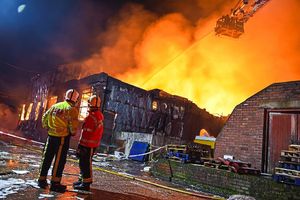
“Although we do attend arson attacks on buildings and vehicles, the most common incidents of deliberate fires are grass fires. The service experienced an unprecedented period of demand last summer through a combination of deliberate fires and an extended hot and dry spell of weather.”
The heatwave of 2018 made it all too easy for small fires to turn into big ones. The number of deliberately ignited grass fires Staffordshire Police tackled last year was more than double the previous year.
“Our firefighters were battling with grass fires for days at a time in hot and uncomfortable conditions,” Mr Bywater added. “We had to devote a large number of people and equipment to bringing them under control and it was literally all hands to the pump.
“Fortunately, nobody was injured in any of the fires which could easily have been the case.
“Deliberate fires can result in injury to the person setting the fire, or others who may become trapped by a rapidly developing fire. People have also been killed as a result of deliberate fire setting.
“Setting a fire on purpose has a huge economic impact as well as posing a danger to people and animals. Properties and businesses can also be damaged having an effect on the local economy as well. The fires on the Staffordshire Roaches moorlands also destroyed fragile natural habitats and endangered wildlife. The simple act of starting a small fire for fun can have disastrous and far-reaching consequences.”
The brigade’s response was the to attempt to educate young people in the consequences of arson. Football clubs and other organisations were drafted in to help keep young people entertained during the summer.
“On our website we also offered the incentive of a chance to win a £50 gift card to get youngsters to sign a pledge not to set deliberate fires which garnered more than 6,000 views and nearly 300 pledges.”

“Deliberately set fires are dangerous; they waste time and money, and keep our crews away from real emergencies.”
Staffordshire Police advises victims to keep a record of all events they think might be related to the arson attack, including the date and time of incidents. The force also advises people to get photographic or video evidence of the crime being carried out, but says only to do this carefully and without putting themselves at risk.
West Midlands Fire Service recorded more arson attacks than the two other counties combined in 2017/18, including a major blaze at Heartlands Furniture Wholesale Ltd in Smethwick which was only brought under control by the efforts of 40 firefighters.
The service says it uses data to spot any emerging arson trends.
Group Commander Juliet Malone, of West Midlands Fire Service’s prevention team, said: “The consequences of fires started deliberately can’t be underestimated. They’re a menace on many levels – the huge emotional cost of a life lost; the distress and disruption caused by the destruction of a home, business or vehicle; environmental pollution; financial cost.
“They also put our firefighters in danger. We mitigate the risks through our training, safe systems of work and familiarisation visits to certain premises, but there will always be dangers at any fire scene.
“Our response to such fires requires many resources, aside from the obvious emergency vehicles and crews. A fire control crew will handle the 999 call and manage the required attendance. We might also send a specialist team to investigate the cause of the fire.
“They often cause severe disruption in communities and to businesses.
“While we’re responding to these fires, we’re clearly not able to be out in our communities helping our most vulnerable people to live safely and healthily, or our businesses to be stronger.
Intelligence
“We use sophisticated data and mapping systems that allow us to spot any emerging trends or patterns. This intelligence enables us to work with partners such as West Midlands Police and our local councils to target our joint efforts, complementing the many prevention activities that our staff carry out.”
She added: “During our ‘Safe and Well’ visits we provide advice to householders, for example on where best to store their wheelie bin if we’ve identified that wheelie bin fires are a local issue.”
In Shropshire, the county’s fire and rescue service attempts to tackle the arson problem through five main areas: prevention, protection, education, response and detection investigation.
The service works with police to identify people and places where anti-social behaviour needs to be reduced, while also targeting high arson risks. The service also delivers a range of programmes in schools, including educating pupils around the dangers of arson. Finally the service tries to detect patterns of anti-social behaviour leading to arson and stamp it out.
Spokesman Derek Taylor said: “Arson fires, to an extent matched by no other crime, can devastate families resulting in death or serious injury, causing a lifetime of physical, psychological and financial pain. Seeing properties and vehicles damaged by arson can often take their toll upon an area. Such scenes increase community fear of crime and add to the perception that it is unsafe and the community is in decline.”




